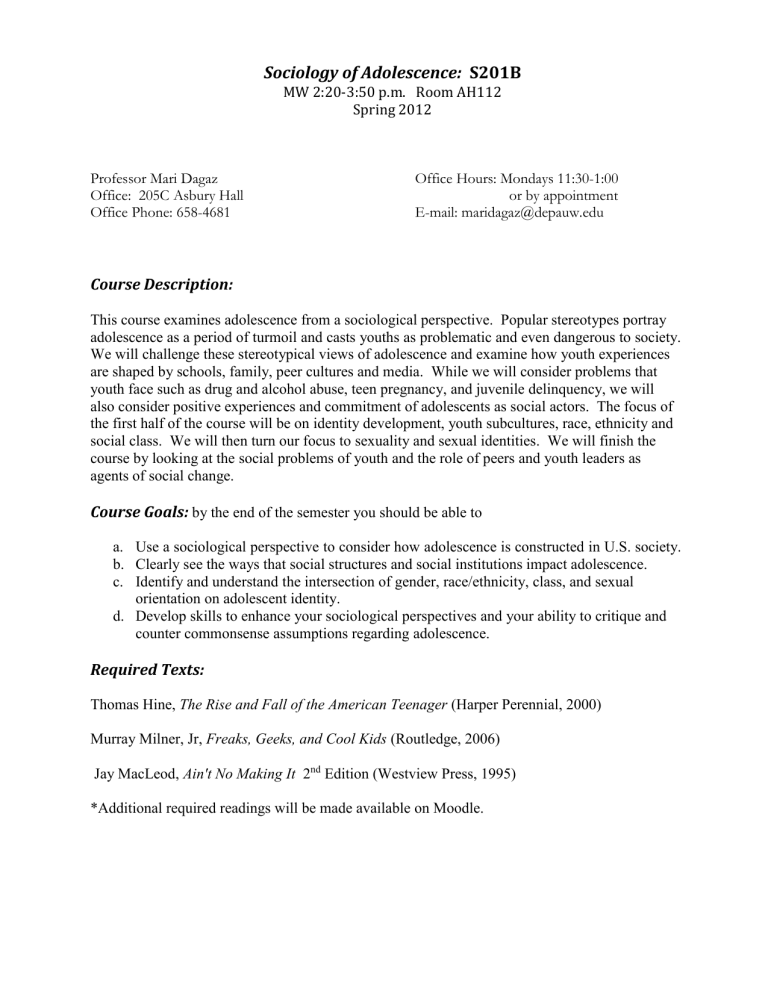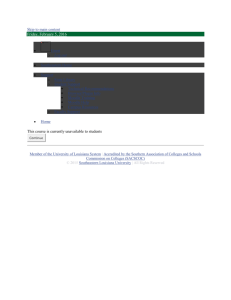Sociology 100 - DePauw University

Professor Mari Dagaz
Office: 205C Asbury Hall
Office Phone: 658-4681
Sociology of Adolescence: S201B
MW 2:20-3:50 p.m. Room AH112
Spring 2012
Office Hours: Mondays 11:30-1:00
or by appointment
E-mail: maridagaz@depauw.edu
Course Description:
This course examines adolescence from a sociological perspective. Popular stereotypes portray adolescence as a period of turmoil and casts youths as problematic and even dangerous to society.
We will challenge these stereotypical views of adolescence and examine how youth experiences are shaped by schools, family, peer cultures and media. While we will consider problems that youth face such as drug and alcohol abuse, teen pregnancy, and juvenile delinquency, we will also consider positive experiences and commitment of adolescents as social actors. The focus of the first half of the course will be on identity development, youth subcultures, race, ethnicity and social class. We will then turn our focus to sexuality and sexual identities. We will finish the course by looking at the social problems of youth and the role of peers and youth leaders as agents of social change.
Course Goals:
by the end of the semester you should be able to a.
Use a sociological perspective to consider how adolescence is constructed in U.S. society. b.
Clearly see the ways that social structures and social institutions impact adolescence. c.
Identify and understand the intersection of gender, race/ethnicity, class, and sexual orientation on adolescent identity. d.
Develop skills to enhance your sociological perspectives and your ability to critique and counter commonsense assumptions regarding adolescence.
Required Texts:
Thomas Hine, The Rise and Fall of the American Teenager (Harper Perennial, 2000)
Murray Milner, Jr, Freaks, Geeks, and Cool Kids (Routledge, 2006)
Jay MacLeod, Ain't No Making It 2 nd
Edition (Westview Press, 1995)
*Additional required readings will be made available on Moodle.
Course Requirements:
Exams: There will be two in-class essay exams. The first exam will be given in class on
Wednesday, March 21 st ; the second exam will be on Wednesday, April 25 th .
Papers: You will be required to write three papers over the course of the semester. The first two papers will be response papers on an assigned reading.
Assignments for the semester will be established the first week of class. Response papers are due by 8:00 a.m. on the morning in which the reading will be discussed in class. The third paper will be a topical analysis and is due on Wednesday, May 9 th . Detailed instructions for the papers will be handed out in class.
In addition, there will be regular in-class writing assignments. You must be present for the inclass work and makeup assignments will not be allowed. Please review the section on Late
Work/Make-up Work on the next page.
Collaborative Presentation: You will be required to participate in a collaborative presentation on the course topic chosen for your third paper. Detailed instructions, topic assignments and presentation groups will be determined mid semester and will be handed out in class.
Class Participation: You are expected to come to class prepared and ready to participate actively in the class session. You are expected to have read the texts and other required materials carefully and comprehensively before the class session. You will be graded on your participation at midterm and again at the end of the semester. Assessment of participation will be based on the quality and regularity of your participation. While there will be course lectures, this class is based heavily on discussion and will allow ample time for all students to participate.
Participation means being actively involved in the class and orally communicating your ideas.
You must demonstrate that you have read the materials and have listened to others. Discussion does not mean simply waiting for your opportunity to speak, but rather listening carefully and responding in a thoughtful manner to the discussion.
Because this class will be primarily discussion based, it is essential that you prepare for class by doing the assigned readings for each class as well as bringing discussion questions about the readings.
Course Policies:
Classroom Etiquette:
Arrive on time and stay for the full class.
Cell phones and other electronics need to be turned off during class.
Use of laptops will not be allowed during class.
Courtesy: Discussions and lectures may involve topics that you find controversial. You will be expected to be respectful toward your classmates regardless of disagreements you may have with a classmate’s ideas. It is important for all of us to foster an environment that allows for expression of thoughts as well as questioning or critiquing arguments presented by others. I ask that you present an open mind and be willing to use logic and evidence to present your own arguments and in critiquing the arguments of others.
2
Academic Integrity: All students at DePauw University are bound by the policy on academic integrity. See me immediately if you do not understand your obligations as a student. In written papers, appropriate citations must be used when you are drawing ideas from an author or quoting another’s work. Plagiarism with be dealt with according to university policy whether intentional or unintentional. If you are unsure how to appropriately cite other’s work, see me for assistance.
Please Note: Your written work must be original and prepared for this class. Turning in work prepared for another class is academic dishonesty.
Special Needs: DePauw University is committed to providing equal access to academic programs and university-administered activities and reasonable modifications/accommodations to students with disabilities in compliance with the Americans with Disabilities Act (ADA) of
1990, as amended in 2008. Any student needing special accommodations due to a disability should contact the Coordinator of Student Disability Services, Pam Roberts, 302 Harrison Hall or call (765) 658-6267.
It is the responsibility of each student to discuss implementation of approved modifications/accommodations with me within one week of the date of receiving a modification/accommodation approval memo or within the first two weeks of the academic semester.
Late Work/Make-up Work: Paper and exam due dates are firm and will only be changed in the event of an extreme emergency. Exceptions will be made if I receive, in advance, an official notification that you will be off campus on university business (e.g., athletic competition) or if I receive proper notification of serious illness such as hospitalization. No other exceptions will be made (this includes faulty alarm clocks, minor illness, job interviews, weddings, cheap plane tickets, etc.). Unexcused late papers will be penalized by a one step grade reduction for every
24-hour period in which they are late. For both excused and unexcused absences from class, it is your responsibility to find out what you missed from your peers. Please do not ask me for my lecture notes or for a private reenactment of the class.
Grade Calculations: Grades will be calculated based on the following point system.
Exam 1 100 points ** IMPORTANT!
Exam 2
Paper 1
Paper 2
Paper 3
In-Class writings
Presentation
Participation
1 st
half of semester
2 nd half of semester
150 points
50 points
50 points
100 points
25 points
75 points
25 points
25 points
_________
600 points
Students must complete pass the course. all assignments to
Failure to complete any assignments (with
Total the exception of in-class writings) will result in automatic failure of the course .
3
Grading Scale:
558-600 pts.(93.0%-100%): A 438-461 pts. (73.0%-76.9%): C
540-557 pts.(90.0%-92.9%): A- 420-437 pts. (70.0%-72.9%): C-
522-539 pts.(87.0%-89.9%): B+ 402-419 pts. (67.0%-69.9%): D+
498-521 pts.(83.0%-86.9%): B 378-401 pts. (63.0%-66.9%): D
480-497 pts.(80.0%-82.9%): B- 360-377 pts. (60.0%-62.9%): D-
462-479 pts.(77.0%-79.9%): C+ 0-359 pts (Less than 60%): F
How grades are determined:
A = Work that goes beyond the requirements of the assignment by adding new insight, creativity and/or particularly thoughtful analysis. Demonstrates a comprehensive command of the course material, an exceptional ability to apply concepts to the real world, and a superior ability to organize and express ideas.
B = Work that clearly meets the requirements of the assignment. Demonstrates a solid command of the course material, an ability to apply concepts to the real world with only minor problems, and good organization and expression of ideas.
C = Work that satisfactorily meets the requirements of the assignment. Demonstrates acceptable command of the course material, a basic ability to apply concepts to the real world with some gaps and problems, and moderate skill in the organization and expression of ideas.
D = Work that marginally meets the requirements of the assignment. Demonstrates little command of the course material, minimal attempt to apply concepts to the real world, and limited ability to organize and express ideas.
F = Work that does not meet the requirements of the assignment. Demonstrates no command of the course material, unable to appropriately or consistently apply concepts to the real world, and insufficiently organizes and expresses ideas.
4
Schedule: (subject to change) ** Assigned readings are to be completed prior to class on the date listed.
Part I: Historical View of Adolescence
Week 1
Jan. 30: Introductions
Feb. 1: Hine , Intro: “Are Teenagers Necessary?” pp. 1-9, Ch. 1: “The Teenage Mystique” pp. 10-
26, Ch. 2 “Only a Phase?” pp. 27-42.
Week 2
Feb. 6: Hine
, Ch. 3: “Coming of Age in Utter Confusion” pp. 43-56, Ch. 4: “Family Values” pp.
57-75.
Feb. 8: Hine , Ch. 8: “The Invention of High School” pp. 138-157.
Part II: Identity Development and Youth Subcultures
Week 3
Feb. 13:
Feb. 15:
Milner , “Introduction,” pp. 2-10, “Ch. 1: Why Do They Behave Like That?” pp. 11-23.
“Ch. 2: The Tools for Understanding” pp. 24-33.
Milner , “Ch.3: Fitting In, Standing Out, and Keeping Up” pp. 34-55, “Ch. 4: Steering
Clear, Hanging Out, and Hooking Up” pp. 56-74. “Ch. 5: Exchanges, Labels, and Put-
Downs,” pp. 75-91.
Week 4
Feb. 20: Ortner , “ ` Burned Like a Tattoo' High School Social Categories and `American Culture'”
Ethnography (2002) 3 (2): 115-148 (Moodle)
Kinney , “From Nerds to Normals: The Recovery of Identity among Adolescents from
Middle School to High School” Sociology of Education (1993) 66: 21-40. (Moodle)
Feb. 22: Hemmings , “Lona’s Links” Anthropology & Education Quarterly (2000) 31(2):152-172
(Moodle)
Part III: Race, Ethnicity and Social Class
Week 5
Feb. 27: MacLeod , Ch. 3 “Teenagers in Clarendon Heights: The Hallway Hangers and the Brothers” and Ch. 4 “The Influence of the Family”
Feb. 29: MacLeod , Ch. 5 “The World of Work: Aspirations of the Hangers and the Brothers” and
Ch. 6 “School: Preparing for the Competition”
Week 6
Mar. 5: MacLeod , Ch. 7 “Leveled Aspirations: Social Reproduction Takes Its Toll”
Mar. 7: McDermott & Samson , “White Racial and Ethnic Identity in the United States” Annual
Review of Sociology (2005) 31:245-261 (Moodle)
Grossman & Charmaraman , “Race, Context, and Privilege: White Adolescents’
Explanations of Racial-ethnic Centrality” Journal of Youth and Adolescence (2009)
38:139-152. (Moodle)
5
Week 7
Mar. 12: Fordham , “Dissin' "the Standard": Ebonics as Guerrilla Warfare at Capital High”
Anthropology & Education Quarterly (1999) 30(3): 272-293 (Moodle)
Wilson and Sparks , “It’s Gotta be the Shoes”: Youth, Race and Sneaker Commercials”
Sociology of Sport Journal (1996) 13:398-427 (Moodle)
Mar. 14: Phelan, Davidson, and Yu , Students' Multiple Worlds: Navigating the Borders of Family,
Peer, and School Cultures. (Moodle)
Week 8
Mar. 19: Kao
, “Group Images and Possible Selves Among Adolescents: Linking Stereotypes to
Expectations by Race and Ethnicity” Sociological Forum , (2000) 15(3): 407-430 (Moodle)
Mar. 21 : EXAM ONE
Week 9 SPRING BREAK!!!!
Mar. 24 – Apr. 1
Part IV: Sexuality and Sexual Identity
Week 10
Apr. 2: Elliott , “Parent’s Constructions of Teen Sexuality: Sex Panics, Contradictory Discourses, and Social Inequality”
Symbolic Interaction . (2010) 33(2): 191-212 (Moodle)
Schalet , “The Sleepover Question” New York Times, July 23, 2011
Irvine , “Emotional Scripts of Sex Panics” Sexuality Research & Social Policy (2006) 3(3):
82-94
Apr. 4: Durham , “Girls, Media, and the Negotiation of Sexuality: A Study of Race, Class, and
Gender in Adolescent Peer Groups” J&MC Quarterly (1999) 76(2): 193-216 (Moodle)
Lamb , “Feminist Ideals for a Healthy Female Adolescent Sexuality: A Critique” Sex Roles
(2010) 62:294–306 (Moodle)
Schalet , “The Significance of Relationships in Dutch and American Girls’ Experiences of
Sexuality” Gender & Society (2010) 24: 304-329 (Moodle)
Week 11
Apr. 9: Hird & Jackson
, “Where ‘angels’ and ‘wusses’ fear to tread: sexual coercion in adolescent dating relationships”
Journal of Sociology (2001) 37(1):27-43. (Moodle)
Pascoe
, “Dude You’re a Fag: Masculinity and Sexuality in High School.” (Moodle)
Apr. 11: Messner
, “Becoming 100 Percent Straight”
(Moodle)
Hammack, Thompson, & Pilecki
, “Configurations of Identity Among Sexual Minority
Youth: Context, Desire, and Narrative” Journal of Youth & Adolescence (2009) 38:867-883.
(Moodle)
Smith
, “The Ideology of “Fag”: The School Experience of Gay Students”
The Sociological
Quarterly (1998) 39(2):309-335
6
Part V: The Problems of Adolescents
Week 12
Apr. 16: Sanders
, “Coming of Age: How Adolescent Boys Construct Masculinities via Substance
Use, Juvenile Delinquency, and Recreation” Journal of Ethnicity in Substance Abuse (2011)
10(1): 48-70 (Moodle)
Chambliss
, “The Saints and the Roughnecks”
Society, (1973) 11(1) : 24-31 (Moodle)
Apr. 18: Miller et al
, “Generic Processes in the Production of Relations among Incarcerated
Week 13
Juvenile African American Males and Female Correctional Officers” Sociation Today
(2009) 7(2) ( http://www.ncsociology.org/sociationtoday/v72/juvenile.htm
) (Moodle)
Apr. 23: Mollborn & Jacobs , “We’ll Figure a Way”: Teenage Mothers’ Experiences in Shifting Social and Economic Contexts Qualitative Sociology (2011) (Moodle)
Yardley
, “Teenage mothers’ experiences of stigma”
Journal of Youth Studies (2008)
11(6):71-684 (Moodle)
Apr. 25 : EXAM TWO
Part VI: Youths as Agents of Change
Week 14
Apr. 30:
May 2 :
Russell et al , “Youth Empowerment and High School Gay-Straight Alliances” Journal of
Youth & Adolescence (2009) 38:891–903 (Moodle)
Gonzales , “ Left Out But Not Shut Down: Political Activism and the Undocumented
Student Movement” Northwestern Journal of Law and Social Policy (2008) 3:219-239
(Moodle)
Student Presentations
Week 15
May 7 :
May 9 :
Student Presentations
Student Presentations
Paper Three Due
7









